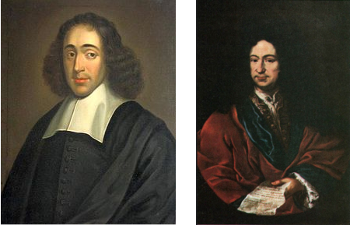
Spinoza and Leibniz
Recent News
- The final examination will be held on Friday, December 19, at 6:00 P.M. in the regular classroom.
This is the home page of G. J. Mattey’s Philosophy 170, Spinoza and Leibniz, for Fall Quarter, 2014.
The Course
Philosophy 170 introduces the student to central works by two great seventeenth century rationalists, Baruch Spinoza and Gottfried Wilhelm Leibniz.
General Catalog Course Description
Seventeenth-century philosophical writings of Spinoza and Leibniz. Topics drawn from both philosophers include: the nature and existence of God, the nature of mind, the relation between mind and body, human freedom, metaphysical monism vs. pluralism
The Topic
The seventeenth century saw the birth of what has come to be known as the modern philosophy,
which broke in many ways from the philosophy of the ancients and medievals. Two of the central figures in the development of early
modern philosophy were Baruch (Benedict) Spinoza (1632-1677) and Gottfried Wilhelm Leibniz (1646-1716).
Spinoza is best known for his posthumously published Ethics, with its bold thesis that all of reality consists of a single substance, identified with God. The human mind is said to be a mode of God’s attribute of thought, while the human body is a mode of God’s attribute of extension, as are all other bodies. Thus, there is no creation of beings separate from God. Human action is strictly determined by the prior states of the mind and the body.
Leibniz was a prolific author whose doctrines, unlike those of Spinoza, are not fully developed in any of his published work. He distinguished sharply between God and created beings, the latter comprising the best of all possible created worlds. Leibniz sometimes described created beings as monads,
which change on the basis of their inner nature, without influence by (yet in harmony with) any other created beings. This doctrine riased major issues regarding human freedom, which are discussed in his correspondence with Antoine Arnauld. Moreover, all created beings are like mirrors that represent all other created beings and so are like minds. Space is merely the order of the co-existence of created beings and time the order of the succession of their states.
